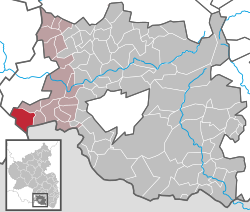Hornbach
| Hornbach | ||
|---|---|---|
|
||
| Coordinates: 49°11′17″N 7°22′09″E / 49.18806°N 7.36917°ECoordinates: 49°11′17″N 7°22′09″E / 49.18806°N 7.36917°E | ||
| Country | Germany | |
| State | Rhineland-Palatinate | |
| District | Südwestpfalz | |
| Municipal assoc. | Zweibrücken-Land | |
| Government | ||
| • Mayor | Reinhold Hohn (FDP) | |
| Area | ||
| • Total | 13.32 km2 (5.14 sq mi) | |
| Elevation | 233 m (764 ft) | |
| Population (2015-12-31) | ||
| • Total | 1,475 | |
| • Density | 110/km2 (290/sq mi) | |
| Time zone | CET/CEST (UTC+1/+2) | |
| Postal codes | 66500 | |
| Dialling codes | 06338 | |
| Vehicle registration | PS | |
| Website | www.stadt-hornbach.de | |
Hornbach is a municipality in the Südwestpfalz district, in Rhineland-Palatinate, Germany. It is situated southwest of the Palatinate forest, on the border with France, south of Zweibrücken. It is part of the Verbandsgemeinde ("collective municipality") Zweibrücken-Land.
The monastery was the most likely reason for the founding of the town of Hornbach. According to legend, Saint Pirmin (†11/3/753) chose this area for the foundation of the monastery. A plaque in the renovated monastery museum indicates that the monastery was founded in 737. Pirmin is buried in a crypt near the old church, a short distance from the monastery.
In 1220, Hornbach was under the direct ecclesiastical rule of the Bishop of Metz. King Charles IV, Holy Roman Emperor 1316-1378, also known as King Karl IV of Weisswasser in Bohemia, gave the town Hornbach its town rights on 16 April 1352, in connection with the establishment of a mayoral office.
Hieronymus Bock, considered the first modern botanist, lived at the monastery beginning in 1533.
'Hornbach was supposedly uninhabited from 1636 for 3 years, during the Thirty Years' War (1618–1648). At this time, the completely emptied and desolate area was avoided by the troops. Due to the war, the number of citizens decreased from 88 families, 10 widows with 75 houses to 30 citizens and 5 widows. 40% of the population was evacuated. The craftsmen began the rebuilding in 1648. In 1657, the reinstatement of the town rights was confirmed. With respect to agriculture, in Zweibrücken as in Westrich, where there were extensive vineyards, these vineyards were not replanted'. After the war, the Dukes of Zweibrücken called Tryolean and Swiss immigrants into their emptied lands (Westrich). During the "Reunion" (1680–1697), the Duchy Palatinate-Zweibrücken was incorporated into the centralist French state. Foreign immigrants were encouraged to settle in the Saar and Alsace provinces by receiving generous privileges. On 17 October 1680, the French government promised settlers the following: cattle, goods, and money, in addition to a tax-free period of 10 years. Later, the Duchy of Palatinate-Zweibrücken fell as a result of the French Revolution. See also, "Schweizer Einwanderer im Westrich, 1650-1750, Zweibrucker Arbeitsgemeinschaft fur Familienforschung 1995, ."
...
Wikipedia



